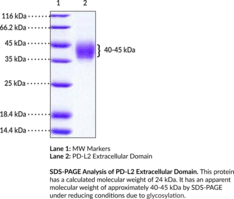Territorial Availability: Available through Bertin Technologies only in France
- Correlated keywords
- PDL2 PDL 2 B7DC B 7 CD 273 PDCD 1LG2 IL4 IFN? PD1 SDSPAGE HEK 293 bA574F11.2 Btdc PDCD 1L2 PDCD1LG2
- Product Overview:
Programmed cell death 1 ligand 2 (PD-L2), also known as B7-DC and CD273, is a B7 family protein that is involved in regulation and attenuation of the adaptive immune response.{53686,52533} It is a 273-amino acid type I transmembrane protein encoded by the PDCD1LG2 gene in humans and is comprised of a 221-amino acid extracellular domain consisting of a signal peptide, an IgV-like domain, and an IgC-like domain, a transmembrane domain, and a cytoplasmic domain.{56030,53692} PD-L2 is expressed in dendritic cells and macrophages and is induced by IL-4 and IFN-?.{53686} Binding of PD-L2 to its receptor, programmed cell death protein 1 (PD-1; Item No. 28377), suppresses T cell proliferation and cytokine production.{52533} PD-L2 is also expressed in a variety of tumor types, and elevated expression of PD-L2 in tumor tissue is associated with decreased overall survival in patients with hepatocellular carcinoma.{56031,56032} Cayman’s PD-L2 Extracellular Domain (human, recombinant) protein can be used for ELISA and binding assay applications. This protein consists of 211 amino acids, has a calculated molecular weight of 24 kDa, an a predicted N-terminus of Leu20 after signal peptide cleavage. By SDS-PAGE, under reducing conditions, the apparent molecular mass of the protein is 40 to 45 kDa due to glycosylation.
Cayman Chemical’s mission is to help make research possible by supplying scientists worldwide with the basic research tools necessary for advancing human and animal health. Our utmost commitment to healthcare researchers is to offer the highest quality products with an affordable pricing policy.
Our scientists are experts in the synthesis, purification, and characterization of biochemicals ranging from small drug-like heterocycles to complex biolipids, fatty acids, and many others. We are also highly skilled in all aspects of assay and antibody development, protein expression, crystallization, and structure determination.
Over the past thirty years, Cayman developed a deep knowledge base in lipid biochemistry, including research involving the arachidonic acid cascade, inositol phosphates, and cannabinoids. This knowledge enabled the production of reagents of exceptional quality for cancer, oxidative injury, epigenetics, neuroscience, inflammation, metabolism, and many additional lines of research.
Our organic and analytical chemists specialize in the rapid development of manufacturing processes and analytical methods to carry out clinical and commercial GMP-API production. Pre-clinical drug discovery efforts are currently underway in the areas of bone restoration and repair, muscular dystrophy, oncology, and inflammation. A separate group of Ph.D.-level scientists are dedicated to offering Hit-to-Lead Discovery and Profiling Services for epigenetic targets. Our knowledgeable chemists can be contracted to perform complete sample analysis for analytes measured by the majority of our assays. We also offer a wide range of analytical services using LC-MS/MS, HPLC, GC, and many other techniques.
Accreditations
ISO/IEC 17025:2005
ISO Guide 34:2009
Cayman is a leader in the field of emerging drugs of abuse, providing high-purity Schedule I-V Controlled Substances to federally-licensed laboratories and qualified academic research institutions for forensic analyses. We are certified by ACLASS Accreditation Services with dual accreditation to ISO/IEC 17025:2005 and ISO Guide 34:2009.





